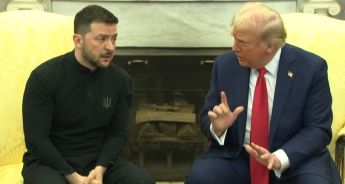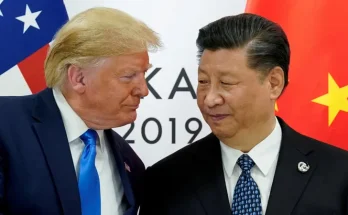Trump: “More Difficult” to Work with Ukraine Than Russia in Peace Talks
In a striking admission, US President Donald Trump has said he finds it “more difficult, frankly, to deal with Ukraine” than with Russia in his ongoing attempts to broker peace between the two nations.
Speaking from the Oval Office on Friday, Trump claimed the US is “doing very well with Russia” and suggested that negotiating with Moscow may be easier than dealing with Kyiv. His comments come just hours after he floated the idea of imposing major sanctions and tariffs on Russia—but only if a ceasefire with Ukraine was reached.
US Suspends Military Aid and Satellite Access to Ukraine
Meanwhile, tensions between the White House and Kyiv continue to escalate. The US has temporarily suspended Ukraine’s access to high-resolution satellite imagery, space technology firm Maxar confirmed, following Trump’s controversial decision to pause military aid to Ukraine.
This latest move comes just one week after an extraordinary public clash between Trump and Ukrainian President Volodymyr Zelensky, where the US president berated Zelensky for being “disrespectful” to American support. The fallout was swift—Trump cut off all military aid and intelligence-sharing with Ukraine, sparking concerns among NATO allies.
Russia Steps Up Attacks as Trump Softens on Putin
In the wake of Trump’s policy shifts, Russia launched a large-scale missile and drone attack on Ukraine’s energy infrastructure on Thursday night. Trump initially signaled he might respond with tougher sanctions, stating that “Russia is absolutely ‘pounding’ Ukraine on the battlefield right now.”
Yet, in an abrupt shift, Trump appeared to defend Russian President Vladimir Putin, saying that “anyone in that position would be doing the same” and suggesting that Putin actually wants to end the war—something Trump isn’t sure Ukraine is willing to do.
“I want to know they [Ukraine] want to settle, and I don’t know that they do,” Trump remarked, justifying his decision to cut off military assistance to Kyiv.
NATO Allies Stunned as US Pushes Ukraine Toward a Deal
Trump’s direct engagement with Putin—while alienating Ukraine—has rattled NATO allies, who have largely isolated Moscow since its full-scale invasion of Ukraine in February 2022.
Despite Trump’s hardline stance on Zelensky, his foreign policy team has recently softened their tone toward Ukraine, perhaps in response to criticism over the US’s abrupt withdrawal of military and intelligence support.
Sources suggest that Washington wants Ukraine to strike a deal that would give the US a significant stake in Ukrainian minerals while also pressuring Zelensky to agree to a quick truce with Moscow. However, Zelensky is demanding firm security guarantees for Kyiv before any deal is signed.
Trump, for his part, appears dismissive of Ukraine’s security concerns, stating that such guarantees “could be discussed later” and calling them the “easy part” of negotiations.
US Blocks Ukraine’s Satellite Access Amid Peace Push
In another blow to Ukraine’s military capabilities, Maxar, a US-based space technology company, confirmed that Washington has temporarily suspended Ukrainian access to critical high-resolution satellite imagery.
Satellite intelligence is a vital tool in modern warfare, allowing armies to track enemy movements and plan counterattacks. The National Geospatial-Intelligence Agency (NGA), which operates under the US Department of Defense, confirmed the move was made “in accordance with the administration’s directive on support to Ukraine.”
While the White House has not publicly commented on the decision, analysts believe this is another pressure tactic to push Ukraine toward a settlement with Russia.
The Bigger Picture
Trump’s shifting stance on Ukraine—from tough talk on sanctions to direct engagement with Putin—marks a dramatic turning point in US foreign policy. His administration’s suspension of aid and intelligence-sharing, combined with the temporary blackout of satellite support, signals a major recalibration of American strategy in the conflict.
As the war in Ukraine enters a critical phase, the question remains: Is Trump forcing Ukraine into a deal with Russia, or is he merely playing hardball to broker an end to the war on his terms?
One thing is clear—this high-stakes diplomatic gamble has put the future of US-Ukraine relations—and NATO unity—on the line.
High-Stakes Diplomacy: Trump’s Officials to Meet Zelensky’s Team in Saudi Arabia
In a critical diplomatic move, senior officials from President Donald Trump’s administration will travel to Saudi Arabia next week to engage in high-level talks with Ukrainian President Volodymyr Zelensky’s team. The meeting comes amid growing pressure on Zelensky to accept Trump’s demands for a peace settlement with Russia.
Zelensky, who has been navigating a tense standoff with Washington, expressed hope that the talks will be “meaningful” and reiterated Ukraine’s commitment to ending the war.
“We are ready for peace as soon as possible,” Zelensky said on Friday, emphasizing that Ukraine had already put forward “concrete steps” to achieve it. However, he insisted that Russia must be the one forced into peace.
“Every day, new Russian strikes and reality itself prove that it is Russia that must be forced to peace,” he added, reinforcing Ukraine’s stance against conceding too much in negotiations.
Zelensky Works to Repair Ties with Trump
Following his highly publicized clash with Trump, Zelensky has been making efforts to mend relations with the US—a crucial ally in Ukraine’s war effort. In a diplomatic overture, he recently sent a letter to Trump, which US special envoy Steve Witkoff said contained an “apology” and a “sense of gratitude” toward the American administration.
“Hopefully, we get things back on track with the Ukrainians, and everything resumes,” Witkoff said, hinting at a possible thaw in relations.
Despite these gestures, Trump’s administration remains firm, and the upcoming Saudi Arabia talks are expected to be pivotal in determining the future of US-Ukraine cooperation.
European Allies Ramp Up Military Support
While Trump pressures Ukraine toward a deal, European leaders are forging ahead with major military support initiatives. Officials in the UK have confirmed that around 20 countries are interested in forming a “coalition of the willing” to bolster Ukraine’s defenses, signaling that Europe is prepared to take on a bigger role in the conflict.
Escalating Violence on the Ground
Meanwhile, the fighting in Ukraine rages on. On Friday, Russian troops killed five people in the Donetsk region, according to local authorities. The ongoing assaults highlight the intensifying battlefield conditions even as diplomatic efforts unfold.
The Road Ahead
With the Saudi Arabia meeting on the horizon, the stakes have never been higher for Zelensky. The question remains—will Ukraine agree to Trump’s terms, or will it hold firm in its demands for stronger security guarantees before any peace deal is signed?
One thing is certain: the outcome of these talks could redefine the future of the war and Ukraine’s alliances for years to come.



